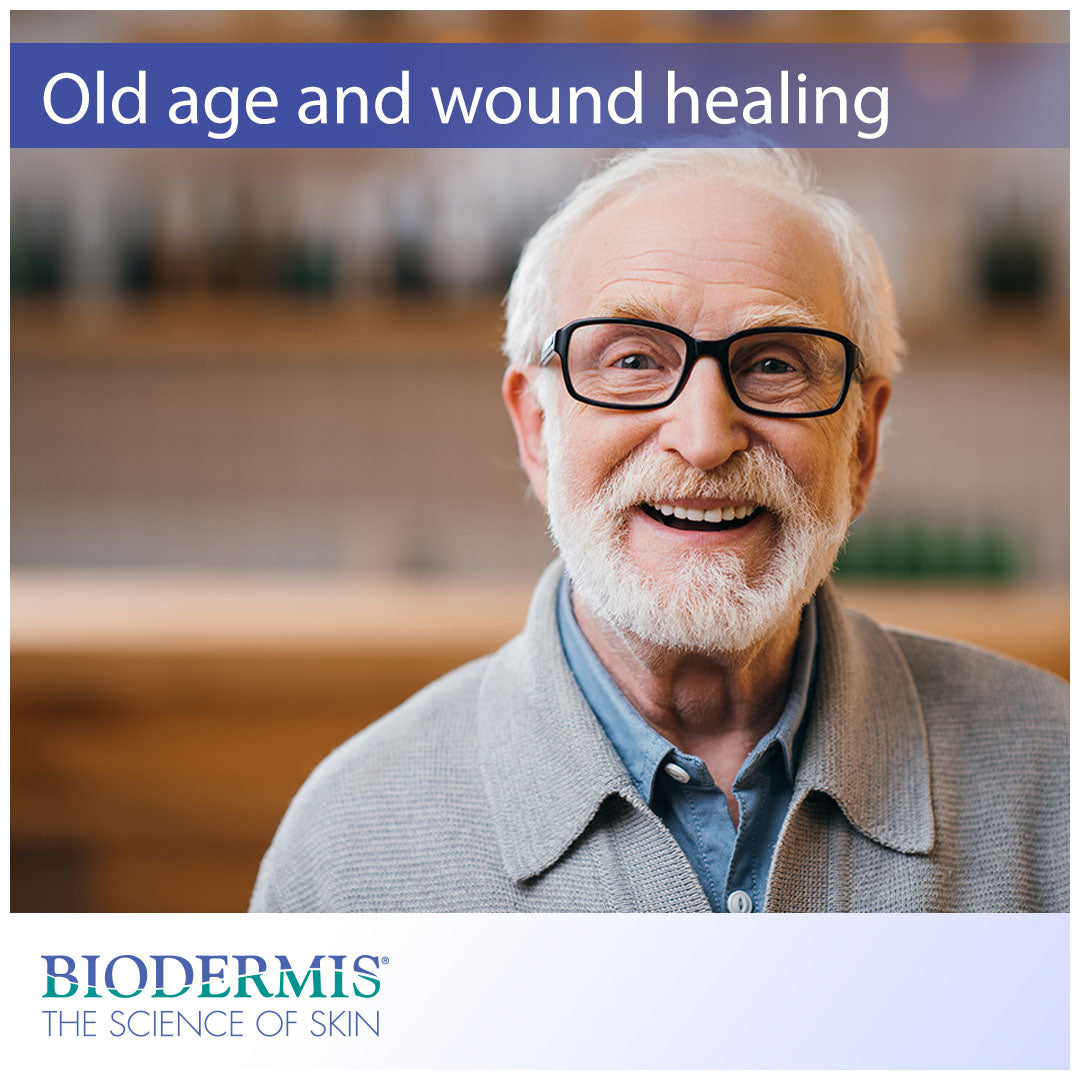As we get older we begin to notice that our bodies don’t function as well as they used to. Joints and muscles start aching, energy levels decrease, and our bodies’ ability to heal becomes less efficient. This is especially true with regards to wound healing. Generally speaking, the older a person is, the longer it will take for a wound to fully heal. This can also lead to wound infections and a greater risk of scarring. While there’s no way to reverse the aging process and eliminate the burden of long wound-healing processes, there is a way to minimize the amount of scarring that occurs later in life.
Continue reading to learn more about the effects of age on wound healing and discover a safe and effective method for reducing scars.
Wound healing and age
During World War I, more and more attention was being drawn to the fact that the wounds of older soldiers took much longer to heal than those of young soldiers. The current science behind why this is the case isn’t entirely clear, but research is progressing towards a better understanding. The wound healing process is one of the most complex and intricate events that occur in the human body. As soon as we attain a wound, the body signals to our skin cells that something is wrong. New skin and immune cells rush to the open wound to fill it in to protect the body from infection and the loss of blood. These new skin cells will develop into a scab and eventually new tissue in the form of a scar. But the wound healing process isn’t perfect because scar tissue has, on average, 20% less tensile strength than normal tissue.
What happens as we age is that the new skin cells that rush to an open wound become much slower to respond. Immune signals that normally tell new skin cells to respond don’t work as efficiently, or sometimes not at all. Another aspect that contributes to a decrease in the wound-healing function is the loss of collagen in the skin as we age. Collagen is the most abundant structural protein in our bodies. When the skin loses collagen, it loses its strength and begins to sag and wrinkle. Collagen plays an important role in the skin and gives it its shape and form. When we start to lose this structure, we become more at risk for wounds that take much longer to heal.

Post-operative scar care
Scarring is a natural part of wound healing that occurs during the final stage of the healing process known as maturation. While scarring is often unavoidable, especially in old age, there are ways to ensure that it isn’t noticeable. The first step starts with proper wound care. This means keeping your wound clean and protected which helps prevent infection. Once the wound has fully healed and you are left with a scar, it’s time to start using medical-grade silicone gel.
Medical-grade topical silicone for scars is the only proven solution for the treatment and management of keloids and hypertrophic scar formations. Doctors trust silicone because it is backed by more than 30 years of clinical evidence. Silicone gel works through the mechanisms of dermal hydration and collagen regulation. Scars need an ideal balance of oxygen and moisture, also known as homeostasis. This ideal environment helps the scar site rearrange the built-up collagen (what causes raised, discolored scars) to be flatter and smoother. What you are left with is a scar that is barely noticeable and that blends in nicely with the surrounding skin.
Continue reading to learn more about the effects of age on wound healing and discover a safe and effective method for reducing scars.
Wound healing and age
During World War I, more and more attention was being drawn to the fact that the wounds of older soldiers took much longer to heal than those of young soldiers. The current science behind why this is the case isn’t entirely clear, but research is progressing towards a better understanding. The wound healing process is one of the most complex and intricate events that occur in the human body. As soon as we attain a wound, the body signals to our skin cells that something is wrong. New skin and immune cells rush to the open wound to fill it in to protect the body from infection and the loss of blood. These new skin cells will develop into a scab and eventually new tissue in the form of a scar. But the wound healing process isn’t perfect because scar tissue has, on average, 20% less tensile strength than normal tissue.
What happens as we age is that the new skin cells that rush to an open wound become much slower to respond. Immune signals that normally tell new skin cells to respond don’t work as efficiently, or sometimes not at all. Another aspect that contributes to a decrease in the wound-healing function is the loss of collagen in the skin as we age. Collagen is the most abundant structural protein in our bodies. When the skin loses collagen, it loses its strength and begins to sag and wrinkle. Collagen plays an important role in the skin and gives it its shape and form. When we start to lose this structure, we become more at risk for wounds that take much longer to heal.
Post-operative scar care
Scarring is a natural part of wound healing that occurs during the final stage of the healing process known as maturation. While scarring is often unavoidable, especially in old age, there are ways to ensure that it isn’t noticeable. The first step starts with proper wound care. This means keeping your wound clean and protected which helps prevent infection. Once the wound has fully healed and you are left with a scar, it’s time to start using medical-grade silicone gel.
Medical-grade topical silicone for scars is the only proven solution for the treatment and management of keloids and hypertrophic scar formations. Doctors trust silicone because it is backed by more than 30 years of clinical evidence. Silicone gel works through the mechanisms of dermal hydration and collagen regulation. Scars need an ideal balance of oxygen and moisture, also known as homeostasis. This ideal environment helps the scar site rearrange the built-up collagen (what causes raised, discolored scars) to be flatter and smoother. What you are left with is a scar that is barely noticeable and that blends in nicely with the surrounding skin.
Biodermis is an innovative market leader with 30 years of expertise in the medical silicone industry. Visit Biodermis.com today to explore a complete range of scar management and post-operative care solutions.
PHYSICIANS AND MEDICAL PROFESSIONALS: REFER OR RESELL?
Biodermis offers custom tailored referral programs designed to simplify and reduce the cost of your patients' post-op care. Additionally, we offer professional pricing if you opt to retail our products. Give us a call at 800.322.3729, and we will be happy to provide additional details on these programs.



